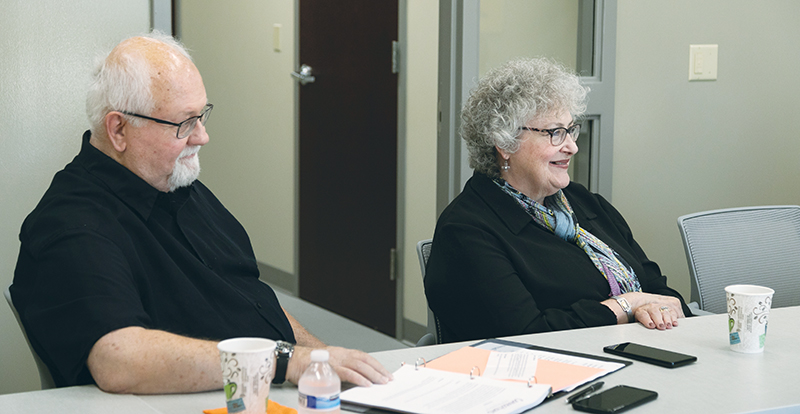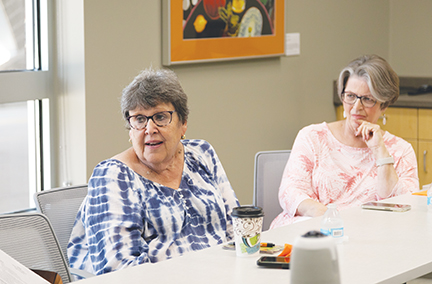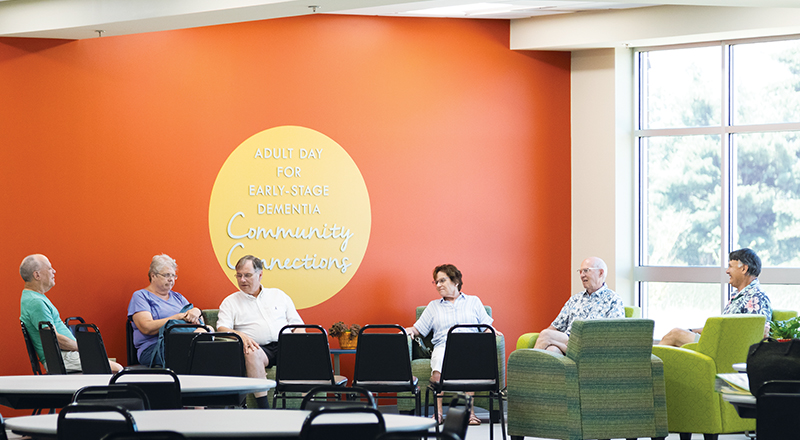
CEDAR RAPIDS, Iowa — When people connect to the Family Caregivers Center here or the Chris & Suzy DeWolf Family Innovation Center for Aging & Dementia, they may be surprised at all that those centers offer for people living with dementia and their caregivers.
There are one-on-one and group counseling sessions, multiple support groups offered at various times for a wide variety of needs, journaling groups, exercise groups, spirituality groups, singing groups, social groups, caregiver respite services, educational presentations, podcasts, online resources, a library and more.
How can two centers with a shared staff of only about a half dozen paid associates offer such expansive programming and services? The key is that the centers have cultivated a mighty corps of volunteers and engage that group in virtually every facet of the centers' work. The centers have a philosophy that every person has value and purpose, and they apply that credo not only to their clients but also to their volunteer corps. Under this philosophy, they've tapped people of all ages and skill levels in the centers' development and operations.
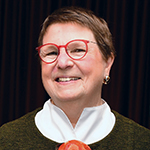
"Volunteers are critical to us," says Kathy Good, founder and senior director of the centers. "At the start, everyone including me was a volunteer, and even now that we have paid staff, we're continually recruiting volunteers."
Talent-spotter
The centers are affiliated with Mercy Cedar Rapids.
From the very beginning, Good prioritized involving numerous people on a volunteer basis in contributing their expertise, wisdom, creativity and energy to the centers' establishment and operations. Volunteers who support Good say she has a knack for discerning how the skills, talents, knowledge, professional background and life experience of people all around her could benefit people with dementia and their caregivers. They add that Good is skilled at convincing people to commit their time and talents — and treasure — to the centers.
The vast majority of the centers' approximately 130 volunteers have caregiving experience, and many are or were caregivers for someone with dementia. Many are local retirees.
Kitchen cabinet
There are countless paths that people took to their volunteerism and countless ways they contribute as volunteers.
Some of the first volunteers were community leaders with caregiving experience who Good recruited to a committee that dubbed itself the "Kitchen Cabinet." They provided input on the caregiver center's formation, including helping with its strategic planning. Though membership has shifted, an oversight committee remains active.
Some volunteers created and now maintain a comprehensive binder of practical resources for caregivers. One volunteer has been developing a website where caregivers will be able to form a virtual community. One volunteer has been designing the graphics for center materials. Some volunteers provide respite services for caregivers, who bring the person they are caring for when they visit the center to attend events. Some provide clerical assistance with the centers' newsletter and mailings.
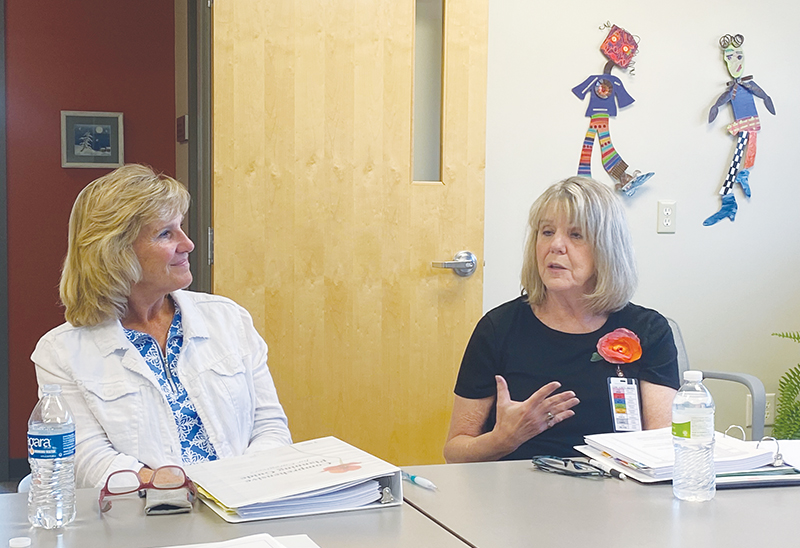
Many volunteers have collaborated to put together or facilitate the numerous groups that the centers offer, such as support groups, educational events, exercise programs, spirituality programs and others.
Before serving in roles that interface directly with people who have dementia, volunteers complete training based in part on the work of Judy Cornish. She is an author and retired elder law attorney who developed the Dementia & Alzheimer's Wellbeing Network, or DAWN. The DAWN training focuses on the idea that, as Cornish says on her website, people with dementia should be "recognized for their strengths and emerging gifts rather than being silenced and sidelined." The training acquaints the centers' volunteers with what changing cognitive abilities are and how best to interact with people whose cognitive abilities are changing.
Purpose, passion
Julie Jensen is retired from special education leadership. She had served on a Mercy patient family advisory board with Good and when they reconnected about a decade ago, Good asked her to join the Kitchen Cabinet.
"You can't say no to Kathy," says Jensen.
Jensen has since served on the cabinet and has had a hand in developing the centers' programming. She says she "fell in love" with the caregivers' center. She says she has enjoyed engaging with the centers' staff, volunteers and participants. And she has learned a lot about caregiving, while she also has contributed her own expertise. She helped to care for her husband when he was undergoing colorectal cancer treatments and then cared for her mother who had dementia.
Having served in numerous leadership roles with her Sisters of Mercy congregation — at the national and local levels — and with the National Catholic Social Justice Lobby in Washington, Sr. Kathy Thornton, RSM, now is a volunteer with the Cedar Rapids centers. She leads spirituality-related groups.
She says it has "touched my heart" to help caregivers tap into spiritual resources to draw strength. Leading the group also has reconnected her to a caregiving tradition that she observed first in her mother, who was a nurse, and later in her siblings — they cared for her mother after she was diagnosed with dementia, while Sr. Thornton was serving elsewhere.
Cedar Rapids retiree Rick Zingher has helped develop some of the support group programming and serves as one of the facilitators for a group of people with early-stage dementia and their caregivers. He says being a volunteer "is an opportunity to grow — at any age. I believe people need to continually reinvent themselves. And volunteering here has been a real growth experience for me."
Good says this type of mutual growth and engagement and edification for volunteers and clients is exactly what the centers are trying to achieve. And she says this type of personal benefit is very healthy for people who are retired. It's also a way to counter societal stereotypes about how valuable and useful people who are older or who have disabilities are, she says.
Steve Erickson is a retired creative director whose wife died with a variant of Alzheimer's. He has lent his creative expertise to multiple branding projects of the center, and he helped design a book Good wrote, My World Wore a Bow Tie.
Erickson says that it has been gratifying to give his time to a cause that has such meaning for him. He says he's unaware of other places like the centers in the region, and "there's a lot of pride knowing we've been a part of this. We've built this and we've grown this unique resource."

